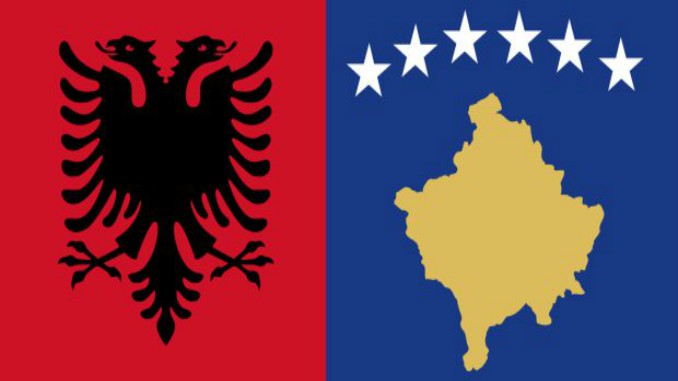
In February 2017 Tanjug news agency reported that Albanian Prime minister Edi Rama stated that „sooner or later, Albania and Kosovo will have joint embassies abroad”[1]. Continuing with a statement that “if anyone sees in this fact the idea of a Great Albania, this is their problem. This is not a matter of a Great Albania,” he didn’t alleviate all of the concerns present in the Western Balkans public. Potential for creation of Great Albania is often used in the public discourse in the region, and is often used for short-term political gains; politicians from Serbia, Montenegro and Macedonia know that old suspicions regarding Great Albania can galvanize their respective citizens in an instant.
In his interview given to Koha ditore, Kosovo daily newspaper, Rama explained that the establishment of joint embassies is in order to reduce costs. Portal KoSSev reported that Kosovo and Albania have so far formalized joint diplomatic action through a joint secretariat that began with work in late November 2016, and through previously opened joint consulates in Munich[2], Bari and Milan. Cooperation is carried out on the basis of the “Declaration on strategic partnership and cooperation”. Cooperation between two countries is common through their respective representatives in foreign country; they often hold mutual festivals of cultural, cuisine etc. The roots of this measure lie a few years prior, in 2011, when Albin Kurti, former leader of the Self-determination, met for the first time then President of Albania, Bamir Topi, and then Minister of Foreign Affairs of Albania, Edmond Haxhinasto. The main purpose of this visit was the initiation of an agreement between Kosovo and Albania for a mutual or common representation in other countries[3].
This kind of practice is not unheard in diplomatic circles: Canada and Australia share their consulate infrastructure in dozens of countries for more than thirty years[4] and in 2012 Canada also announced their plan to share diplomatic missions with United Kingdom. On the occasion, William Hague, then foreign secretary of UK said that this practice is not unheard of, as “UK also shares several premises with France and Germany”[5]. On the other hand, this move was slow and mostly symbolic, and has drawn some criticism because of concerns about Canada’s continued ability to represent itself abroad.
In 2014, Foreign Ministry of Slovakia also considered merging diplomatic services within common embassies in third countries, mainly with other EU member states in order to lessen the costs. One year later, the Swiss cabinet approved of the act enabling the sharing of embassy premises with the Netherlands and Denmark in several countries[6]. Spain’s twelve autonomous communities also started an embassy sharing program, aiming to cut cost by millions of EUR[7]. Balkan countries have also considered this measure: three years ago, The Macedonian government has said it is considering Serbia’s idea of sharing embassies in far-flung locations with neighboring countries to save money, portal Balkan Insight reported[8]. Same portal reported that a Montenegrin diplomat in Kosovo stated that Montenegro also intended to one day set up joint diplomatic representatives’ offices with a number of countries, including Kosovo, Macedonia and Albania[9]. All of these measures are declared to have the same goal: reducing the costs required for diplomatic mission to keep running unabated.
Of course, combining embassies of, for instance, Switzerland and Denmark for reasons of thrift is very different and evokes vastly more benign reactions, particularly in the Western Balkans. We must stress that even though Albanians as an ethnicity are scattered across the region, and are due to language and cultural ties naturally directed at each other for cooperation, any movement that resembles pan-Albanianism or movement towards Greater Albania can be interpreted as potentially destabilizing acts. Albania and Kosovo must alleviate the concerns of neighbors with strict demarcation of sovereignty, even in shared establishments.
Proposed measure for creation of joint embassies are not controversial as much as it is perceived, as it encompasses sharing of building, premises, technical personnel etc. It does not cover sharing of responsibilities or diplomatic personnel. Two diplomatic missions remain separate as they are envoys of separate countries. Only concerns that can be raised is, as in case of UK and Canada, one country in that case can become “dominant”, but this can be a product of different acumen of two neighboring diplomats.
Source: European Western Balkans
Note: This article has been produced with the support of the Balkan Trust for Democracy. The content of this article and the opinions expressed herein are the sole responsibility of the portal European Western Balkans and in no way reflect the views and opinions of the Balkan Trust for Democracy nor the German Marshall Fund of the United States.